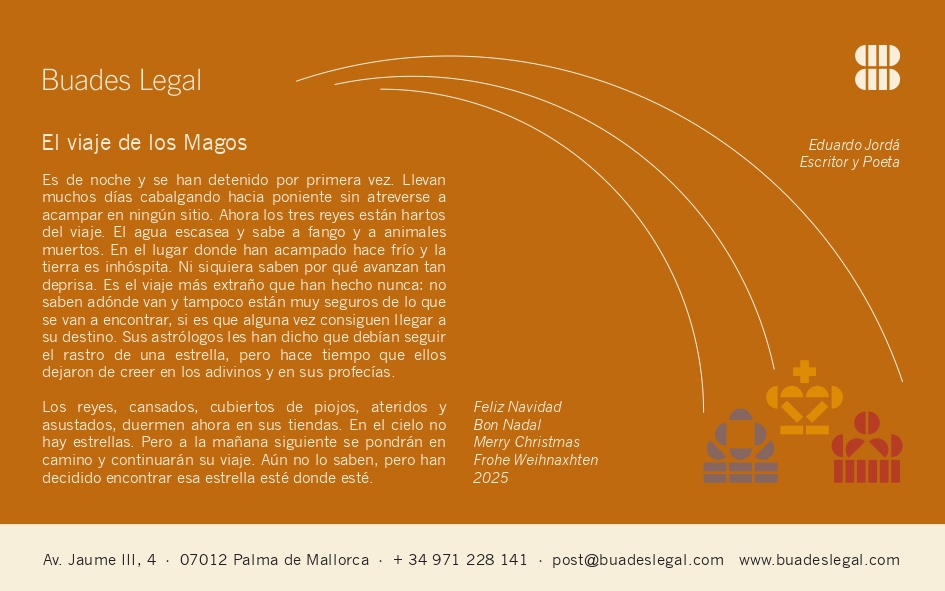Punishability for self-laundering with regard to Supreme Court ruling 165/2016, of 2 March
[As discussed by Llorenç Salvà over working breakfasts at Bufete Buades]
Introduction
Few subjects are as frequently discussed in criminal law as the offence of money-laundering and its scope.
Theory and jurisprudence have failed to concur on whether it is correct to penalize money-laundering as a separate offence, independently of the original crime, or whether it is conduct which should be subsumed under the original offence and not therefore deemed punishable.
More specifically, one of the most controversial questions surrounding its definition in the Criminal Code and application of the offence of money-laundering is the possibility of admitting cases of so-called «self-laundering», in which the person that legalizes the assets is the same person that previously obtained them by committing the crime in question.
- The offence of money-laundering: legislative evolution
The precursor to the current regulation is found in the criminal reform of this law which incorporated into the 1973 Criminal Code a specific type of receiving stolen goods (article 546 bis f), which referred to the exploitation of proceeds obtained from drug trafficking.
This limitation of money-laundering to the sphere of drug trafficking was progressively overcome, first in the preventive realm and later in Criminal Law.
Specifically, the new Criminal Code extended money-laundering to include the products of any serious offence, revoking the previous disperse and contradictory legislation, and situating all forms of money-laundering in articles 301 to 304 among offences against the socioeconomic order in Chapter XIV, Title XIII, Book II, under the title «On receiving stolen goods and other related crimes». Moreover, the gains could be the product of any serious crime committed in Spain or abroad.
Article 301.1 of the Criminal Code punishes a person that «acquires, converts or transfers assets, knowing that these originate from a serious offence, or carries out any other act in order to conceal or disguise their unlawful origin, or help the person who has taken part in the crime or crimes to elude the legal consequences of their actions».
- There followed a process of broadening of the scope of infractions that could be included under the concept of «predicate offence»:
Organic Law 15/2003, of 25 November, in amendment of the Criminal Code, allowed that the assets could be the result of committing any crime, whether serious or not, be it drug trafficking, terrorism, financial crimes, etc., thus considerably broadening the scope of money-laundering in the punitive text.
This amendment went beyond Framework Decision 2001/500. Content to require that the author of the crime acted knowing that the assets “originate from a crime», all of the above were therefore applicable, though often not punishable with a sentence greater than a year in prison (as indicated in the Framework Decision).
Article 301.1 of the Criminal Code punishes a person that «acquires, converts or transfers assets, knowing that these originate from a serious crime, or carries out any other act in order to conceal or disguise their unlawful origin or help the person that took part in the crime or crimes to elude the legal consequences of their actions».
- Organic Law 5/2010, of 22 June, in amendment of Organic Law 10/1995, of 23 November, of the Criminal Code.
In 2010, the Prevention of Money-Laundering and Financing of Terrorism Act 10/2010, of 28 April, and Organic Law 5/2010 amending the Criminal Code, erupted into our legislation.
From its entry into force, section 1.2 of the Prevention of Money-Laundering Act 10/210, «for the purposes of the present Act», regards «all manner of assets whose acquisition or possession originates from a crime as the proceeds of a criminal activity […] including defrauded payments in the case of crimes against the Treasury».
For its part, Organic Law 5/2010, of 22 June, amended paragraph 1 of art. 301 in such a way that, from its entry into force, a person is deemed to commit the crime of money-laundering if he «acquires, owns, uses, converts or transfers assets, (i) knowing that these originate from a criminal activity (ii) committed by himself or any third party», ergo: (a) Self-laundering becomes a punishable offence; and (b) so does the mere possession or use of the assets, facilitating the punishment of persons who commit tax fraud and proceed to own or use the sum of the defrauded payment.
Article 301
- A person that acquires, owns, uses, converts or transfers assets, knowing that these originate from a criminal activity committed by himself or any third party […]
III. Summing up of the facts and procedural path of Supreme Court Judgment 165/2016, of 2 March
The facts under analysis in Supreme Court Judgement 165/2016, of 2 March, originating from judgement 203/2014, of 24 July, handed down by Section 1 of the Guipúzcoa Provincial Court, consist of the misappropriation of over 20 million euros by the Financial Director of a company consortium, who represented and held decision-making powers for the consortium.
In order to do so, between 2003 and 2007, he made arrangements with convicted criminals, who had no connections with the affected companies, and who received the funds that left the affected consortium into their bank accounts. Subsequently, on a few occasions, they appropriated these, either wholly or in part; on other occasions, they afforded a legitimate appearance to the unlawfully obtained increased equity by purchasing property and movable assets, in Spain and abroad, using funds withdrawn in cash to cover their trail and avoid subsequent detection.
- Punishability of «self-laundering»: Legal arguments from the judgement
According to the Supreme Court, all conduct that has no impact on the socioeconomic order would remain beyond the scope of criminality as defined in the Criminal Code. Similarly, the principle of insignificance would preclude criminality for self-laundering in such conduct as, for example, a painting or jewellery in the possession of the person that stole it, or a motor vehicle being used by the same person that purloined it. However, lawmakers are certainly determined that the laundering of the proceeds of a criminal act by the author of that act, even when it can be regarded as an act of exploitation or securing of unlawful gains after sentencing for the main offence, or of self-protection by the author of the crime, must be punished independently on the basis of the special protection of the legal asset it violates: the socioeconomic order of the administration of justice.
The phrase «for the purpose of concealing or covering up the illicit origin» sums up the essence of the legal nature of the crime: the purpose or objective of the activity must be present in all conduct according to the legal classification of the offence.
Art. 301 of the Criminal Code defines as criminal conduct the carrying out of activities intended to conceal or disguise assets obtained from criminal activities, or helping the author of these activities to elude the corresponding penalty. With this interpretation, we avoid taking the penalization to excess, where, for example, the perpetrator of the criminal activity is penalized for «self-laundering» (i) for the mere fact of acquiring the assets which are a necessary and immediate consequence of the crime in question; and (ii) for merely using money corresponding to the non-payment in a tax fraud for ordinary expenses.
Dissenting voices argue that the accused parties should have been absolved of the crime of money-laundering, since the sentence for the crime of misappropriation would have assimilated subsequent activities involving the unlawfully obtained equity.
Hence the general position leads to «unwanted courses of action which are too broad in their retribution». Moreover, it means, in practice, that any crime that generates equity could be punished twice, since the five categories of the offence of money-laundering (acquire, own, use, convert or transfer, and any act intended to conceal or disguise) are so extensive and ill-defined as to generate legal uncertainty.
By Llorenç Salvá, lawyer at Bufete Buades
























